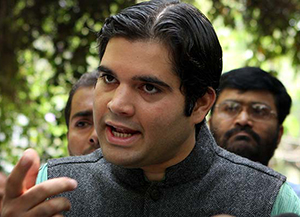New Delhi, Oct 20: BJP MP Varun Gandhi was at the centre of a controversy over allegations that he had leaked defence secrets to middleman Abhishek Verma and arms manufacturers after being "honey trapped", a charge he stoutly denied.
At a press conference here, Swaraj Abhiyan leaders Prashant Bhushan and Yogendra Yadav released a letter written by Edmonds Allen, a New York-based lawyer, to the PMO last month that Varun was honey trapped and compromised by Verma.
He alleged that Verma "blackmailed" Varun, a member of the Defence Consultative Committee, into sharing sensitive information on crucial arms matters.
Varun rejected these charges, saying he has not met Verma since 2004 and threatened to file a defamation suit against Bhushan and Yadav over the charges.
"The entire information presented does not contain an iota of proof that either I had access or shared any communication regarding sensitive information to Verma," Varun said.
Allen, who was a partner of Verma, fell out with him in 2012. Verma is facing trial in the 2006 Naval War Room leak case.
Bhushan alleged that despite having all the details, BJP government did not blacklist Thales, the company that sold scam-tainted Scorpene submarines, as Dassault acquired it. India recently signed a deal with Dassault for 36 Rafale aircraft.
"Any action against Thales may have jeopardised the Rafale deal. Moreover, contrary to previous announcements of getting 126 aircrafts, the government bought 36 aircrafts, paying double the price for individual units. It certainly appears to be the case that something is fishy," Bhushan said.
However, Bhushan and Yadav did not take Varun's name during the press conference and instead asked journalists to refer to the letter. They claimed to have withheld photographic evidences pertaining to the matter.
Allen wrote to the PM, Defence Minister, CBI and the NSA with all the details on August and September this year. Varun said that he last met Verma when he was a post graduate student in London at the age of 22 years.
"I am going to turn 37 now. I have never met him since I entered public life in 2004. The only reason why I even know of him is because his parents were members of parliament and was a respected family. I knew them as many other leaders knew them," he said.
Asked if he had come across any sensitive information during his tenure on the consultative committee on defence, he said, "Any MP who has been on that committee knows that not even 0.1 percentage of any confidential information is shared with the committee."






Comments
Add new comment